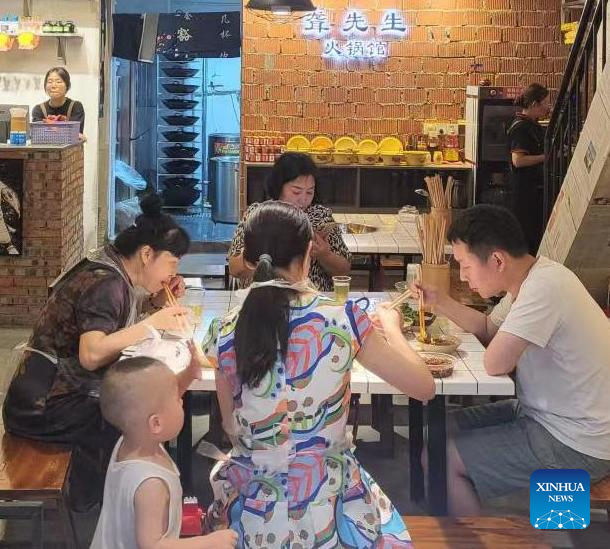
People dine at the hotpot restaurant whose name means "Mr. Deaf," on the street renowned as Chongqing's No. 1 hotpot street in Yubei District, southwest China's Chongqing Municipality, July 9, 2023.(Xinhua/Chen Qingbing)
CHONGQING, Aug. 9 (Xinhua) -- Since there are nearly 30,000 hotpot restaurants in southwest China's Chongqing Municipality, the emergence of a new restaurant normally cannot stun people, but the one whose name means "Mr. Deaf," on the street renowned as Chongqing's No. 1 hotpot street in Yubei District in May, is different.
The name already gives a hint of the hotpot restaurant's background, which is that Wang Tao, a 56-year-old owner, is a hearing-impaired person. After decades of migrant work in Beijing's factories, Wang returned to his hometown several years ago for a more stable life.
"Opening a hotpot restaurant has always been a dream for me. Also, due to the inconvenience of communicating with people, hearing-impaired people might feel uneasy dining outside. I want to provide a carefree environment for hearing-impaired people," said Wang.
Since its opening, the message that a hearing-impaired person opened a hotpot restaurant got around fast in the hearing-impaired group, and so many hearing-impaired people volunteer to support Wang's restaurant by going there, giving free online publicity.
On Kuaishou, a Chinese short-video platform, many hearing-impaired people published videos about this restaurant with full respect. "It is the first hotpot restaurant opened by a hearing-impaired person in Chongqing. We couldn't believe one of us could achieve this. It's truly amazing," said two hearing-impaired girls in one video.
In fact, the process of opening this restaurant was not a smooth-sailing trip. Due to the lack of relevant experience, Wang ran out of money in the middle. When two of his hearing-impaired employees found out about this, they offered to lend him money to move his dream forward.
In spite of a heavy economic burden, during the first three days after its opening on May 18, he invited neighbors to eat hotpot for free.
When Li Dalan, a 43-year woman who volunteers to provide Wang with professional advice in the catering business heard this, she dropped her jaw and told Wang that this was not sensible.
"I am a hearing-impaired person, so I am afraid that sometimes I cannot perfectly satisfy customers' needs. Thus, I want to make my apology first and hope to get their understanding in this way," explained Wang, who also hired four disabled people, with three being hearing-impaired and one being physically handicapped.
Having felt the kindness embedded in Wang's heart and mutual help flowing inside the group, Li also gets deeply involved in her volunteer work. Not only giving tips for opening a restaurant, Li also shows up in this restaurant in her leisure time and helps translate customers' needs to Wang via sign language.
"In just a few months, we received lots of kind feedback to us, from both hearing-impaired and able-bodied customers. Someone once wrote a note saying 'thank you for providing a warm home for the vulnerable,' and some people take hours of train to come here," said Li.
One able-bodied customer named Song Ding said, "Apart from the touching story behind this restaurant, it also serves fresh food and has good taste at a relatively cheap price. So, I will come here to enjoy the food again."
Recently, Wang has also teamed up with a yogurt ice cream shop that has four hearing-impaired staff, inviting them to open a vendor in front of their restaurant on weekends to achieve mutual benefit.
"Around me, most hearing-impaired people's business is at a very small scale, like selling some snacks in a temporary stall. Seeing Wang opening a restaurant, I feel this is big progress for hearing-impaired people. I am really happy to see this happening," said Zheng Hong, a 41-year-old hearing-impaired staff member in the yogurt ice cream shop. ■



